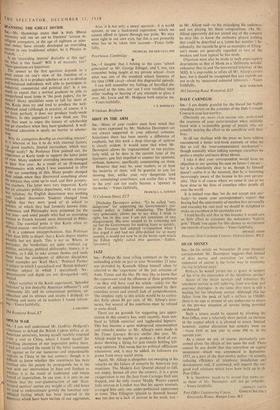S ' 11,--- Mr. Hemmings states that 'a truly liberal University will not
set out to frustrate' certain in- tellivnt youngsters, at the age of eighteen or nine- teen, (who) 'have already developed an overriding inter :st in one traditional subject, be it Physics or
French . • .9 .
Is an 'overriding interest' desirable at this age? What is this based? Will it of necessity last? Thes = questions are important. • The answer to the first question depends to a great extent on -one's view of the function of a univtasity. Is it to produce scholars or is it to develop Weil-balanced individuals well able to participate in Inda. trial, commercial and political life? Is it too much. to expect that a normal graduate be able to e - omprehend most items in 'the posh papers,' for in- stance? Many specialists seem • to fall far short of this. Keete does try and tend to produce the well- balanced mind (although in practice, of course, it is far from perfect); it does not produce ready-made s,e11() ars. Is this important? I now think ..not. The iew that want to enjoy the luxury of scholarship can go elsewhere when they have-graduated. A well- halaticed education is surely no barrier to scholar- -ship.
W ly do youngsters devellap an overriding interest? IS it inherent or has it to do with external factors, . e good teachers, limited curriculum, which may chat) ge easily? As Professor Flew- pointed out, the experience at Keck tends to support the latter point of view. Many students' overriding interests changed in their first year. As a result of an ill-managed tirkstionnaire with which I was associated in 1954 ' Can say something of this. Many people changed their minds when they discovered something about the subjects they came up to read, and their prospec- tive eachers.•The latter were .very important. Keele has an attractive politics department, with an attrac- tive
syllabus; the English department was seething
. with student discontent. Students changed from
i
-• ; En-, , porii sh that they were 'good at' at school to p, cs, of which they had formerly known little. . ceonomics and Philosophy were presented for the ,iirst .;ime—and somd people who had an overriding In ter !st in French became more interested in Philo- '')D11 r. The essential point is that Keele often re-
three Led interest—not frustrated it. . .
It is a common misapprehension, that Professor lw does littleto dispel, that a Keele degree implies breadth but not depth. This is not so. Where, in Particular, the borderlines are quite artificial, e.g. Mit cs, sociology, political philosophy, history, it is Possible, as I did, to take certain themes and study them from the standpoint of different disciplines. ' 190(.1 examples are 'Karl Marx,' Political Parties' ta Su , sject in which I specialised) and 'British Industry' '''nother subject in which I specialised). No: 'Nei ilisation- and depth arc not .disregarded--only . limit xl, r . . Other variables in the Keck experiment, 'Splendid isolation' (a less desirable American influence?), and comtaunity life and its concomitant pettiness, co- cduc Ition and its stresses and strains 1 disliked t• its teaching and many of its teachers I found refresh- ; ing.--Yours faithfully,






































 Previous page
Previous page